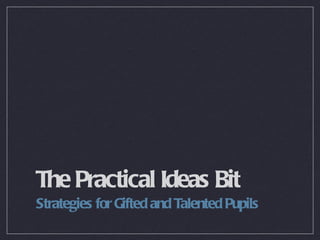G&t
- 1. The Practical Ideas Bit Strategies for Gifted and Talented Pupils
- 2. Get an able pupil to recap on the previous lessons learning
- 3. Ask your more able students to produce more in the same amount of time.
- 4. When setting out a task, give pupils different checklists.
- 6. Get pupils to prepare a resource to teach others.
- 7. Use an able pupil to model their writing or thinking, by explaining their answer/solution to a task to others their answer/solution to a task to others
- 8. Use GCSE questions with able Yr 9 pupils.
- 9. Have differentiated learning objectives: âMust do,â âCould do,â âShould doâ
- 10. Provide opportunities for pupils to respond in ways other than writing: display work, role play, short video films display work, role play, short video films
- 11. Remember that âless is moreâ in some cases. Prescribe the number of words to be used to make more able students think hard before they write, and make every word count.
- 12. Create a role of chair person or lead learner to for students who will then take responsibility and help maintain momentum and focus during tasks. momentum and focus during tasks.
- 13. Get able pupils to summarise instructions to the whole class
- 14. Divide your class into subtle ability-ranged groups.
- 15. Use post-it notes to encourage pupils to ask questions which others can answer.
- 16. Ėý
















